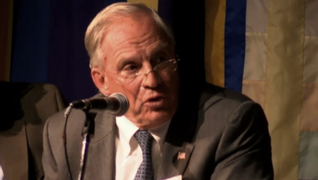
During a conference Tuesday at Hofstra University that assessed the George W. Bush presidency, Amy Goodman asked panelists if senior administration officials should be tried for war crimes. Her question to former national intelligence director and U.S. ambassador to Iraq, John Negroponte, drew this response:
Amy Goodman: “Do you think that, Mr. Negroponte, that knowing what we know today, the Iraq War was wrong? And do you think torture is wrong?”
John Negroponte: “Look, well, torture is never right. And …”
Amy Goodman: “Do think the Bush administration was wrong to engage in it?”
John Negroponte: “I say torture is never right. That’s my first point. But my second point was, I’ll just stick with the way I felt during the time I lived through those events. And you can find quotes of what I said when I was ambassador to the U.N. I was asked if I thought we should use force in Iraq. And I said, well, in questions like this, I think we ought to approach the issue with a great deal of caution.”
According to The Wall Street Journal, Negroponte continued to think about Goodman’s comments after the panel discussion was over. The article about the event ended with this remark:
“Boy, I need a stiff drink after that one,” Mr. Negroponte told a small group of people after the panel on which he and Ms. Goodman served. “Double martini.”
Click here to watch Amy Goodman’s full address at the conference, along with a response from another panelist, former CIA Director Porter Goss.
AMY GOODMAN: Just a quick question. Mr. Goss said, “If we knew then what we know today, we might have done things differently,” which I think is a very reasonable thing to say.
PORTER GOSS: Thank you.
AMY GOODMAN: Do you think that, Mr. Negroponte, that knowing what we know today, the Iraq War was wrong? And do you think torture is wrong?
JOHN NEGROPONTE: Look, well, torture is never right. And—
AMY GOODMAN: Do think the Bush administration was wrong to engage in it?
JOHN NEGROPONTE: I say torture is never right. That’s my first point.
But my second point was, I’ll just stick with the way I felt during the time I lived through those events. And you can find quotes of what I said when I was ambassador to the U.N. I was asked if I thought we should use force in Iraq. And I said, well, in questions like this, I think we ought to approach the issue with a great deal of caution. I also said that we ought to—and I felt that we ought to—allow the inspection process more time to do its work. I was disappointed that it wasn’t allowed. But, you know, you have one president at a time. He’s the commander-in-chief. He’s got the constitutional authority, and that’s what he decided to do.
The last point I would make, to your issue about Hans Blix and Mohamed ElBaradei, Blix and I had a chance to reminisce about this a little bit later on. And I said to him, “It’s amazing, you know? We set up this inspection thing, and we never found anything. And, you know, what the heck happened?” And Blix said, “You know, it’s—that’s right.” But he said, “I can’t—I still don’t understand why Saddam behaved so guilty.” And maybe that’s why he had some doubt, because he was—Saddam sort of emitted, emanated, this sort of sensation that he had—that he was hiding something. Now, some people have speculated—and I think it was an FBI agent who had interviewed him extensively—that, actually, he wanted some people to think that he had WMD in his neighborhood in the wake of the Iran-Iraq War, and so that maybe this was part of his strategy. But it kind of—if indeed it was his strategy, it boomeranged.











Media Options